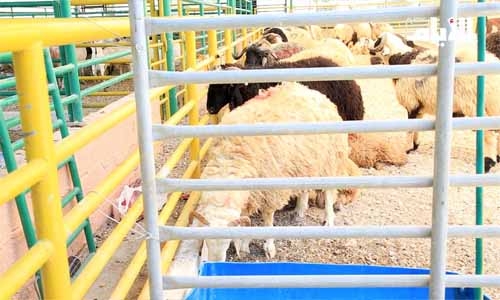Bahrain imports over 32,000 heads of cattle to meet Ramadan demand
TDT | Manama
The Daily Tribune – www.newsofbahrain.com
More than 32,000 heads of sheep, cows and camels are in stock to meet the increased demand during Ramadan, a top Works Ministry official said. Dr Khaled Ahmed Hassan, the Undersecretary for Livestock at the Ministry of Works, Municipalities Affairs and Urban Planning, said the Livestock agency had completed all necessary measures to ensure sufficient quantities of meat market ahead of Ramadan.
“Bahraini traders imported a total of 32,725 thousand heads of sheep, cows and camels,” Dr Hassan said. “This includes 30 thousand heads of sheep, 2,681 heads of cows and 44 heads of camels.”
Around 8 thousand tons of red meat, 4 thousand tons of poultry meat are in stock. “More livestock and frozen meat are to arrive in the coming days,” said Dr Hassan. Bahrain, he said, experiences an increased demand for meat during the holy month of Ramadan and Eid al-Fitr. “This promoted the Livestock Agency to make early arrangements to meet the local demand,” Dr Hassan added.
The shipments of live arrival arrived in the Kingdom from Oman, Jordan, Lebanon and Somalia. “Merchants rely on imports from these countries due to low cost, which provides an opportunity for competition among the traders themselves.”
Dr Hassan also pointed out that the Animal Control Department has doubled its working hours to verify the animal dispatches that reach Bahrain. “Veterinary quarantine is the first line of defence to ensure the safety of imports whether live or slaughtered. There are highly experienced veterinarians to take care of this.”
“The meat shipments to gain entry must carry two certificates, the first is a health certificate, and the other is a halal certificate issued by an approved authority in the country of origin.” “However, attaching health certificate to meat shipments does not replace jobs of the Animal Control Department.” “We inspect every shipment and verify them thoroughly to prevent the transmission of infectious diseases and to preserve the health of the consumer.”
“This is the main focus of our work, and no shipments violating law and regulations pass through official gates,” Dr Hassan assured. Dr Hassan also valued the efforts made by livestock dealers in adhering to the health conditions and appreciated their constructive cooperation in ensuring prices affordable for everyone.
The Undersecretary also urged citizens and residents to approach only the two approved slaughterhouses, one located in the Hamala and the other in the Sitra. “It is important to stay away from random places of slaughter for they pose great danger to health.
Dr Khaled Ahmed Hassan
Related Posts


